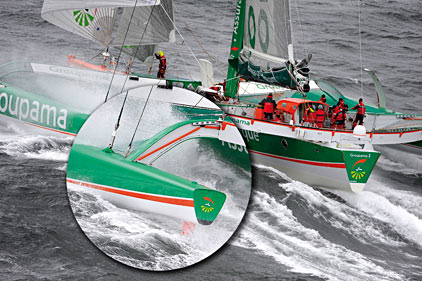
It was at 1216 UT on Monday 16th November, that the skipper of Groupama 3, Franck Cammas, called the Jules Verne Trophy team to inform them that an aft beam bulkhead had broken, leading to serious damage to the float. Despite the storm, Groupama 3 is slowly making headway towards Cape Town some 1,700 miles away (3,000 km) and is therefore abandoning this particular Jules Verne Trophy…
At around 1200 UT this Monday, a big cracking sound dashed the hopes of Franck Cammas and his nine crew in their bid to break Orange 2’s round the world record from back in 2005 (50 d 16h 20′). A bulkhead attached to the aft beam simply gave up the ghost in the harsh conditions as the giant trimaran was sailing with her sails angled at 90° to the true wind in a powerful NNE’ly air flow and rough seas. The crew knew they had to go fast to stay in the right sector of the warm front, hot on their heels, in order to drop down towards the Cape of Good Hope with the Brazilian low. The resulting weakness then caused the windward float to fissure and, in light of the sizeable damage, the crew immediately stopped the boat and concluded that it would be necessary to abandon this round the world attempt.
“We’d spent the night sailing fast to stay ahead of the front and this morning Thomas Coville and Bruno Jeanjean were on deck when they heard a big `crack’: there was a small fissure between the aft beam and the port float. Conditions were really bouncy: we came to a standstill with the wind right on our tail so as to be able to open the hatch and get down inside the float. Part of the section between the beam and the float level with the bulkhead had become detached. As such the structural integrity was reduced by at least half. It is impossible to envisage effecting repairs at sea due to the motion. At the moment we’re still being shaken about: there was 35 knots of wind on the beam at the moment the incident occurred and just now, we’ve been caught up by the front so we’ve got 40 knots of breeze…
We’ve dumped the mainsail and Groupama 3 is running before the wind to avoid any harsh motion. We’re going to draw up a route to avoid having too much wind and excessive waves. We’re heading South to let the second low pass by us tonight and then we’ll head off towards Cape Town tomorrow morning, Tuesday. We’re continuing with the same watch system and I’m working with Stan to see what we can do next. The idea then is to get back to France as quickly as possible: the crew’s up for that and if we can set off again before the end of January then it’s still feasible to make a new attempt!” indicated Franck Cammas during a telephone link-up early this afternoon.
Present during this telephone interview with Franck, Director of External Communication at Groupama Frédérique Granado, explained the situation: “The most important thing is that the crew are safe and sound. Our priority is that they make Cape Town under the safest possible conditions. We know we can count on their experience and their determination to preserve Groupama 3. Hearing them allude to a new departure this winter is the best proof of this.”
Heading towards Africa
As such the wisest solution is to quickly make for port to get a better idea of the true scale of the damage and above all prevent the situation from worsening. Cape Town, around 1,700 miles ahead of the giant trimaran’s bows, will be the quickest pitstop to get to and the sea and wind conditions aren’t too bad. Nevertheless, it’s going to take a week’s sailing for Groupama 3 to tie up to the dock and then be repaired prior to heading North again bound for France.
Clearly the ten men are very disappointed after this ten and a half day planetary adventure. The trimaran had confirmed her fantastic performance by racking up over 700 miles on her way down the North Atlantic and by considerably improving on her own reference time between Ushant and the equator: 5 days 15 hours 23 minutes!
At the point the damage occurred, Groupama 3 still had a 345 mile lead over Orange 2 (that is over half a day) and was making headway at an average speed in excess of 25 knots, on a direct course towards the Kerguelen archipelago. Having hooked onto a Brazilian low on Sunday, after a particularly slow weekend, Franck Cammas and his nine crew were fast approaching the Roaring Forties.
They have since been stopped dead in their tracks but, as Franck highlights, they’re more motivated than ever to effect repairs and set off again as soon as possible this winter for another attempt.